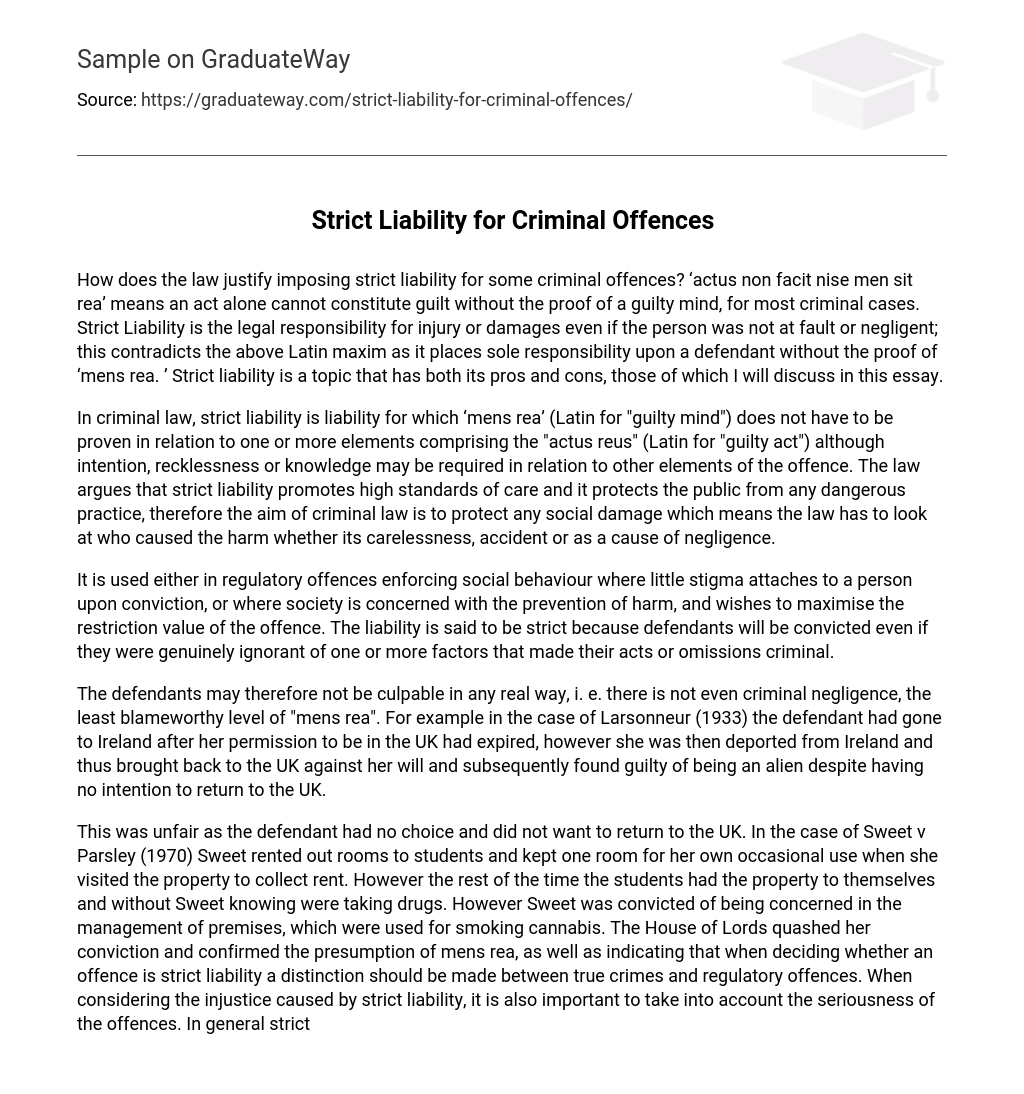How does the law justify imposing strict liability for some criminal offences? ‘actus non facit nise men sit rea’ means an act alone cannot constitute guilt without the proof of a guilty mind, for most criminal cases. Strict Liability is the legal responsibility for injury or damages even if the person was not at fault or negligent; this contradicts the above Latin maxim as it places sole responsibility upon a defendant without the proof of ‘mens rea. ’ Strict liability is a topic that has both its pros and cons, those of which I will discuss in this essay.
In criminal law, strict liability is liability for which ‘mens rea’ (Latin for “guilty mind”) does not have to be proven in relation to one or more elements comprising the “actus reus” (Latin for “guilty act”) although intention, recklessness or knowledge may be required in relation to other elements of the offence. The law argues that strict liability promotes high standards of care and it protects the public from any dangerous practice, therefore the aim of criminal law is to protect any social damage which means the law has to look at who caused the harm whether its carelessness, accident or as a cause of negligence.
It is used either in regulatory offences enforcing social behaviour where little stigma attaches to a person upon conviction, or where society is concerned with the prevention of harm, and wishes to maximise the restriction value of the offence. The liability is said to be strict because defendants will be convicted even if they were genuinely ignorant of one or more factors that made their acts or omissions criminal.
The defendants may therefore not be culpable in any real way, i. e. there is not even criminal negligence, the least blameworthy level of “mens rea”. For example in the case of Larsonneur (1933) the defendant had gone to Ireland after her permission to be in the UK had expired, however she was then deported from Ireland and thus brought back to the UK against her will and subsequently found guilty of being an alien despite having no intention to return to the UK.
This was unfair as the defendant had no choice and did not want to return to the UK. In the case of Sweet v Parsley (1970) Sweet rented out rooms to students and kept one room for her own occasional use when she visited the property to collect rent. However the rest of the time the students had the property to themselves and without Sweet knowing were taking drugs. However Sweet was convicted of being concerned in the management of premises, which were used for smoking cannabis. The House of Lords quashed her conviction and confirmed the presumption of mens rea, as well as indicating that when deciding whether an offence is strict liability a distinction should be made between true crimes and regulatory offences. When considering the injustice caused by strict liability, it is also important to take into account the seriousness of the offences. In general strict liability offences are those of a less serious nature, such as regulatory offences relating to public safety.
For some offences the prosecution would have a difficult time proving the defendant had the necessary men rea, if the offence was not a stict liability case, this results in many guilty defendants escaping conviction. If the defendants had some sort of mens rea such as knowingly or recklessly then it would make convictions very hard. For example, if a person could only be convicted of speeding if the prosecution could prove beyond all reasonable doubt that the defendant was aware he was speeding, then it would be almost impossible to convict.
However, enforcing speed limits, as with many other strict liability offences, is done in the interest of public safety and as such can be seen as important to protect the public from harm. In conclusion I would argue that strict liability, can be seen as unfair in some cases, but serves a valuable purpose in protecting the public. Strict liability could be reformed in some way, such as allowing a general defence of thoroughness to be available in all cases, which may prevent the injustice which is the basis for most criticisms.





